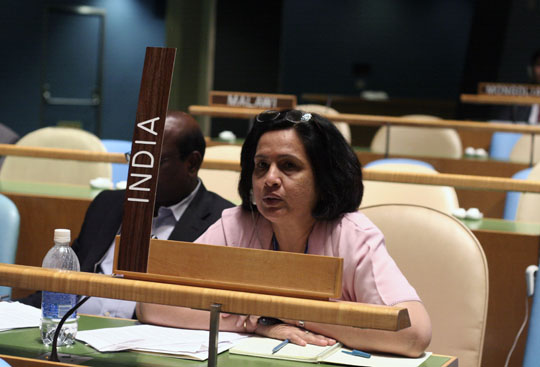United Nations, Jun 15: In a significant victory for India at the UN, international law expert Neeru Chadha has won a crucial election to a top UN judicial body that deals with disputes related to the law of the sea, becoming the first Indian woman to be appointed as a judge at the tribunal.

Chadha, an eminent lawyer andthe first Indian woman to become the chief legal adviser in the ministry of external affairs, won the election yesterday to the International Tribunal for the Law of the Sea (ITLOS) for a nine-year term from 2017 to 2026.
Chadha got 120 votes, the highest in the Asia Pacific group and was elected in the first round of voting itself. The candidate from Indonesia got 58 votes, Lebanon 60 and Thailand 86.
All three candidates went to a second round of voting in which Thailand won the other seat in the Asia Pacific group. Election was held here for a total of seven seats.
India's Permanent Representative to the UN Ambassador Syed Akbaruddin expressed gratitude for the broad support of countries that resulted in Chadha's "emphatic success" at the elections to the ITLOS.
"It reflects both an appreciation of India's global standing in matters of international law and the recognition for Chadha's expertise as alawyer and negotiator on contemporary issues related to the Law of the Seas," Akbaruddin told PTI.
"The Tribunal is composed of 21 independent members who are elected from among persons enjoying the highest reputation for fairness and integrity and of recognised competence in the field of the law of the sea," according to the information on the ITLOS website.
Meanwhile, External Affairs Ministry spokesperson in New Delhi hailed Chadha's elections to the ITLOS saying, "Indian expertise on ITLOS stage! Neeru Chadha elected as 1st woman on Int'l Tribunal 4 Law of Seas w/ most votes in Asia Pacific Group."
The Hamburg-based ITLOS, established in 1996, is one of dispute settlement mechanisms under the UN Convention on the Law of the Sea (UNCLOS) that entered into force in 1994.
Chadha has extensive international arbitration and litigation experience, having served as an agent for the Indian government in its maritime delimitation case with Bangladesh.
She was also India'sagent for the case filed by Italy in ITLOS involving two Italian marines accusedof shooting two Indian fishermen off the coast of Kerala in 2012.
Currently, eminent jurist from India P Chandrasekhara Rao is a judge at the tribunal. He was elected member of the tribunal in 1996 and his term will expire in September 2017.
Chadha is only the second woman to be judge of ITLOS in its two decades of existence, where there have been a total of 40 judges, the Permanent Mission of India to the UN said in a statement.
Chadha holds law degrees including PhD in law from the University of Delhi and the University of Michigan.
She was also the first woman chief legal adviser to the Indian government and has advised the government on diverse issues relating to the law of the sea involving interpretation of various provisions of the UNCLOS including determining the extent of coastal state's jurisdiction in different maritime zones, maritime delimitation with neighbouring states and legal issues relating to submissions on extended continental shelf.
Chadha has also served as an agent before the International Court of Justice (ICJ) in the case concerning the Obligations concerning Negotiations relating to cessation of nuclear arms race and nuclear disarmament with Marshall Islands.
She has represented the Indian government in various other multilateral meetings and conferences in the United Nations, AALCO (Asian African Legal Consultative Organisation), UNIDROIT (International Institute for the Unification of Private Law), UNCITRAL (UN Commission on International Trade Law).
Chadha has also represented Indian government at The Hague Conference, South Asian Association for Regional Cooperation (SAARC) and ay of Bengal Initiative for Multi- Sectoral Technical and Economic Cooperation (BIMSTEC) on subjects relating to human rights, humanitarian law, international trade, international terrorism and international criminal law.





Comments
Add new comment